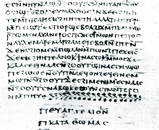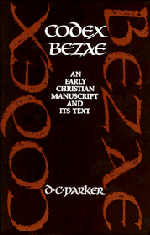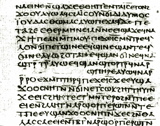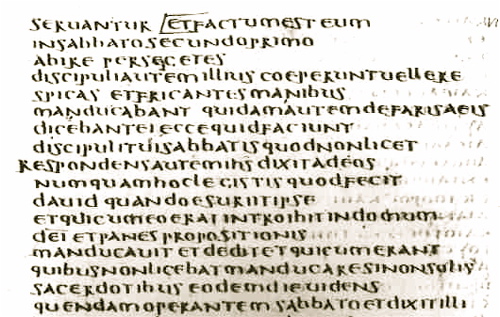Difference between revisions of "Bible"
| Line 4: | Line 4: | ||
[[Image:Codex2hamaddilastpg.jpg|left|thumb|"Codex II, [[Hammadi]], first page at top, last pg.above"]] | [[Image:Codex2hamaddilastpg.jpg|left|thumb|"Codex II, [[Hammadi]], first page at top, last pg.above"]] | ||
[[Image:Origbezae500.jpg|right|original codex bezae]] | [[Image:Origbezae500.jpg|right|original codex bezae]] | ||
| − | |||
'''Bible''' | '''Bible''' | ||
| − | |||
*1. The Christian holy book. | *1. The Christian holy book. | ||
*2. The Jewish holy book that was largely incorporated into the Christian Bible. | *2. The Jewish holy book that was largely incorporated into the Christian Bible. | ||
*3. The analogous holy book of another religion. | *3. The analogous holy book of another religion. | ||
*4. A comprehensive manual that describes something. (e.g., handyman’s bible). | *4. A comprehensive manual that describes something. (e.g., handyman’s bible). | ||
| − | |||
| − | |||
---- | ---- | ||
| − | |||
| − | |||
'''Etymology''' | '''Etymology''' | ||
Latin biblia “a collection of books” (since there are many books in the Bible) < Ancient Greek βιβλία, (biblia) “books”, plural of βιβλίον (biblion) “book”, originally a diminutive of βίβλος (biblos) < βύβλος (bublos) “[[papyrus]]” (from the ancient [[Phoenicia]]n city of [[Byblos]] which exported this writing material) | Latin biblia “a collection of books” (since there are many books in the Bible) < Ancient Greek βιβλία, (biblia) “books”, plural of βιβλίον (biblion) “book”, originally a diminutive of βίβλος (biblos) < βύβλος (bublos) “[[papyrus]]” (from the ancient [[Phoenicia]]n city of [[Byblos]] which exported this writing material) | ||
| − | |||
---- | ---- | ||
| − | |||
Transcription of ''[[Codex Bezae]]'' below: | Transcription of ''[[Codex Bezae]]'' below: | ||
| − | |||
"ET FACTUM EST EUM IN SABBATO SECUNDOPRIMO ABIRE PER SEGETES DISCIPULI AUTEM ILLIUS COEPERUNT VELLERE SPICAS ET FRICANTES MANIBUS 2 MANDUCABANT QUIDAM AUTEM DE FARISAEIS DICEBANT EI ECCE QUID FACIUNT DISCIPULI TUI SABBATIS 3 QUOD NON LICET RESPONDENS AUTEM IHS DIXIT AD EOS NUMQUAM HOC LEGISTIS QUOD FECIT DAUID QUANDO ESURIIT IPSE ET QUI CUM EO ERAT 4 INTRO IBIT IN DOMUM DEI ET PANES PROPOSITIONIS MANDUCAVIT ET DEDIT ET QUI CUM ERANT QUIBUS NON LICEBAT MANDUCARE SI NON SOLIS SACERDOTIBUS." | "ET FACTUM EST EUM IN SABBATO SECUNDOPRIMO ABIRE PER SEGETES DISCIPULI AUTEM ILLIUS COEPERUNT VELLERE SPICAS ET FRICANTES MANIBUS 2 MANDUCABANT QUIDAM AUTEM DE FARISAEIS DICEBANT EI ECCE QUID FACIUNT DISCIPULI TUI SABBATIS 3 QUOD NON LICET RESPONDENS AUTEM IHS DIXIT AD EOS NUMQUAM HOC LEGISTIS QUOD FECIT DAUID QUANDO ESURIIT IPSE ET QUI CUM EO ERAT 4 INTRO IBIT IN DOMUM DEI ET PANES PROPOSITIONIS MANDUCAVIT ET DEDIT ET QUI CUM ERANT QUIBUS NON LICEBAT MANDUCARE SI NON SOLIS SACERDOTIBUS." | ||
[[Category: General Reference]] | [[Category: General Reference]] | ||
Revision as of 02:47, 15 December 2007

Bible
- 1. The Christian holy book.
- 2. The Jewish holy book that was largely incorporated into the Christian Bible.
- 3. The analogous holy book of another religion.
- 4. A comprehensive manual that describes something. (e.g., handyman’s bible).
Etymology Latin biblia “a collection of books” (since there are many books in the Bible) < Ancient Greek βιβλία, (biblia) “books”, plural of βιβλίον (biblion) “book”, originally a diminutive of βίβλος (biblos) < βύβλος (bublos) “papyrus” (from the ancient Phoenician city of Byblos which exported this writing material)
Transcription of Codex Bezae below:
"ET FACTUM EST EUM IN SABBATO SECUNDOPRIMO ABIRE PER SEGETES DISCIPULI AUTEM ILLIUS COEPERUNT VELLERE SPICAS ET FRICANTES MANIBUS 2 MANDUCABANT QUIDAM AUTEM DE FARISAEIS DICEBANT EI ECCE QUID FACIUNT DISCIPULI TUI SABBATIS 3 QUOD NON LICET RESPONDENS AUTEM IHS DIXIT AD EOS NUMQUAM HOC LEGISTIS QUOD FECIT DAUID QUANDO ESURIIT IPSE ET QUI CUM EO ERAT 4 INTRO IBIT IN DOMUM DEI ET PANES PROPOSITIONIS MANDUCAVIT ET DEDIT ET QUI CUM ERANT QUIBUS NON LICEBAT MANDUCARE SI NON SOLIS SACERDOTIBUS."


